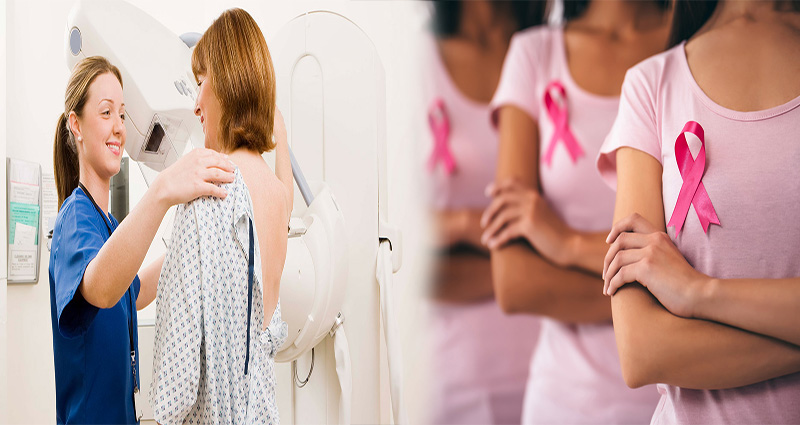Breast cancer is the most common type of cancer in women. It affects all ethnic and racial groups, but certain populations have higher rates of breast cancer than others. Women under 50 years old are at highest risk for developing breast cancer. African American and Hispanic women are more likely to die from breast cancer than white women. Your risk of getting breast cancer increases with age and with a family history of the disease. Nearly two out of every three women diagnosed with invasive breast cancer will be over 60 years old at the time of their diagnosis. About 1 in 8 women will be diagnosed with breast cancer during her lifetime.
Breast cancer is the most common cancer in women.
Breast cancer is the most common cancer in women, and it’s also the second most common cause of death in women. In fact, breast cancer is the most common cancer diagnosed in women under 40 years old.
Breast health encompasses more than just preventing or treating breast cancer; it also means keeping your breasts healthy so that you can enjoy them for years to come.
Breast cancer affects all ethnic and racial groups, but certain populations have higher rates of breast cancer than others.
Breast cancer is the most common cancer in women, but not all ethnic and racial groups are equally affected by it. African American and Hispanic women are more likely to die from breast cancer than white women. In fact, African Americans have a 40% higher mortality rate from all types of cancers compared with whites (1).
The reasons for these disparities aren’t clear, but some researchers suggest that they may be due to differences in access to health care or lifestyle factors such as diet and exercise habits. Additional research is needed before we can fully understand why these differences exist among different ethnicities; however, understanding your own risk factors can help you make informed decisions about your health care choices so that you can take steps toward prevention if necessary!
Women under 50 years old are at highest risk for developing breast cancer.
The risk of breast cancer increases with age, and women under 50 years old are at highest risk for developing the disease. The risk also increases with family history, as well as the number of pregnancies and children you’ve had.
- Age: Women who are over 45 years old should have an annual mammogram (X-ray picture), according to the American Cancer Society (ACS). If you’re between 40 to 44 years old, talk to your doctor about whether or not you should get screened for breast cancer each year.
- Family History: If either one of your parents was diagnosed with breast cancer before they turned 55 years old, then there’s a one in eight chance that you’ll get it too–and even higher if both parents were diagnosed early on in their lives! This doesn’t mean that everyone who has this genetic trait will definitely develop breast cancer; however, it does increase their chances by 2-3 times compared to those without this trait.* Pregnancy Rate: Having multiple pregnancies may increase your risk because certain hormones produced during pregnancy can trigger changes in breast tissue that might lead them down an unhealthy path later on down the road.”
African American and Hispanic women are more likely to die from breast cancer than white women.
African American and Hispanic women are more likely to die from breast cancer than white women, according to the National Cancer Institute. Research shows that African American, Hispanic and Native American women have higher risks of dying from breast cancer than white women do.
This may be because they’re more likely to be diagnosed at later stages when treatment options are more limited or less effective–and because they are less likely to seek care in general.
Your risk of getting breast cancer increases with age and with a family history of the disease.
If you’re a woman, the risk of getting breast cancer increases with age. It’s also true that the more family members you have who have had breast cancer, the higher your own risk will be.
The bottom line here is that if you are over 40 years old and have a family history of breast cancer (or any other type of cancer), then it’s important to get screened regularly by your doctor.
Nearly two out of every three women diagnosed with invasive breast cancer will be over 60 years old at the time of their diagnosis.
Nearly two out of every three women diagnosed with invasive breast cancer will be over 60 years old at the time of their diagnosis. Women who are over 60 and have a family history of breast cancer may have an increased risk for breast cancer, as well as women who are overweight.
About 1 in 8 women will be diagnosed with breast cancer during her lifetime.
Breast cancer is the most common cancer among women. In 2018, it’s estimated that 252,600 American women will be diagnosed with breast cancer and 40,920 will die from the disease.
- Risk factors for breast cancer include:
- Age: The risk of getting breast cancer increases with age (1 in 8 women will be diagnosed during her lifetime). -Family history: Having a family member who has had or currently has breast cancer increases your risk of developing this disease yourself by about 50%. If you have both parents with a history of breast or ovarian cancer (known as hereditary), you have an even higher chance of developing these cancers yourself. -Obesity: Being overweight or obese can increase your chances by 20% to 30%. -Radiation exposure: Women who were exposed to radiation therapy while they were growing up may also be at higher risk for developing later on in life when compared with people who weren’t exposed during childhood
Be aware of your body, get regular checkups, and get mammograms as recommended by your doctor.
- Be aware of your body. Keep an eye out for any changes in your breasts. If you notice something unusual, speak with your doctor about it immediately.
- Get regular checkups and mammograms as recommended by your doctor. Mammograms are recommended every year for women 40 years old and older to screen for breast cancer; however, it’s important to note that they do not prevent all cases of the disease–only diagnose them early enough so that treatment is likely successful if caught early enough (and doesn’t require mastectomy). If there’s any doubt about whether or not you should get screened or if there are other factors involved (such as family history), ask around! You may want a second opinion before making any decisions about mammography screenings.* Do not delay treatment because of cost; insurance coverage varies widely depending on where you live and work so be sure that both parties know what coverage exists before beginning any treatment plan.* Check with your doctor before taking over-the-counter medications such as ibuprofen or acetaminophen while undergoing chemotherapy treatments because these drugs can cause liver damage when taken together
We hope that this article has helped you understand more about breast cancer and its risk factors. If you have any questions or concerns about your health, please contact a doctor immediately.









